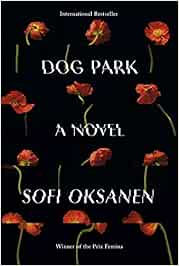3.5 Stars
This is the first book I’ve read by this Finnish writer. From the beginning, I felt disoriented because the narrative jumps around in time and place and because information is withheld.
The novel begins in Finland in 2016. Olenka, a cleaning lady in Helsinki, sits on a park bench and is joined by Daria, a woman whose life Olenka ruined and who also ruined Olenka’s life. As she tries to determine Daria’s intentions, she recalls her life in post-Soviet Ukraine. In 2006, returning to Ukraine after failing to succeed as a fashion model in Paris, Olenka sold her eggs to a fertility agency. Subsequently she became a coordinator for that agency; she matched potential egg donors to would-be parents. Daria was one of her recruits. Slowly the reader learns what happened to bring an end to Olenka’s career and forced her into a life in hiding in Finland.
Much of the time, I was uncertain about what happened in the past and what is actually happening in the present. Olenka, the narrator, doesn’t give complete explanations and so keeps the reader in suspense. She does see Daria’s arrival as a threat; she thinks she is in mortal danger from a number of sources, including a man whom she repeatedly addresses as “you.” (His identity is not given until almost midway through the novel.) Who could be chasing her and why is not revealed for the longest time. Potential readers should be forewarned that not all questions will be answered. The ending in particular may leave readers unsatisfied.
Olenka is an interesting character who is both victim and villain. I found my feelings about her changing more than once. She is determined to escape the subsistence life her mother has and does whatever is necessary to do so. She certainly manipulates others to achieve what she wants, but often she just does what she has to do to survive. One message of the novel seems to be that one can rarely escape one’s past: one of Olenka’s actions as a child has repercussions that would be impossible to foresee.
The plight of women in an unstable society is emphasized. Upon her return to Ukraine, Olenka’s options for a job focus on her body: she can be a model, escort, mail-order bride, surrogate, or egg donor.
The title refers to a park Olenka and Daria visit, but it also refers to the international market of egg donation which is shown to be the equivalent of dog breeding. Wealthy clients have exacting specifications so donors’ backgrounds are massaged to meet those requirements. Donors are drugged to enhance egg production. Once they are no longer useful, they are left with chronic and terminal illnesses. And “there were plenty of mentally disturbed donors.” Both clients and donors are exploited.
The novel references several events in recent Ukrainian history. The 2014 Maidan Revolution is mentioned. Olenka’s family lives in Snizhne in the Donbas, in rebel-held eastern Ukraine, so insight is given into life there: “According to my mother, the Donetsk People’s Republic had taken some people’s homes while offering others a path to riches because the refugees had left behind so much wealth. Some joined the separatist forces voluntarily, while others were press-ganged, and deserters were shot. Some joined because otherwise their homes and possessions would be confiscated, and their loved ones would be left destitute.” The downing of Malaysia Airlines Flight 17 is referenced: “it later turned out that the Russian crew who transported the missile that brought down the Malaysian aircraft had driven their vehicles through Snizhne in broad daylight.” Throughout the book, life in Ukraine is constantly contrasted unfavourably with life in Finland; for instance, Olenka mentions being able to drink water “straight from the faucet without any complicated water purification system” in Finland and dreams of building her family a new house in Ukraine “with a water pump and a bathroom.”
This book will appeal
to readers who enjoy slow-burning suspense and who are comfortable being left
in an almost-constant state of confusion.
I enjoyed it for its glimpses of life in Ukraine after
independence. The Donbas region of
Ukraine is often mentioned in the news about the Russo-Ukrainian War, so
descriptions of life in that area are enlightening.

No comments:
Post a Comment